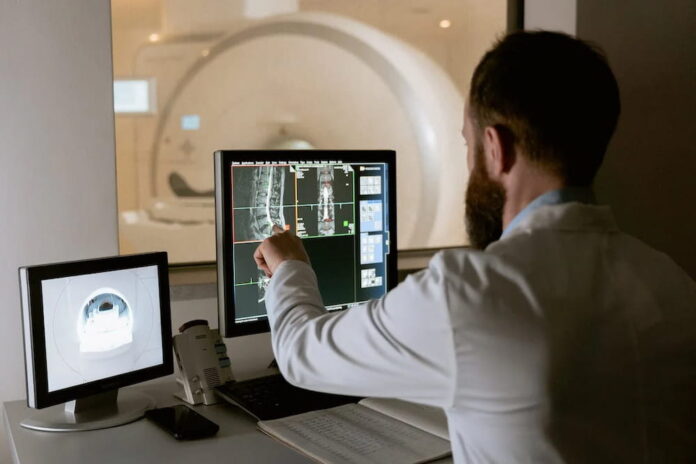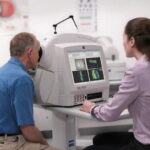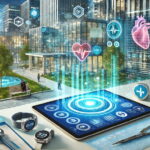Like all industries, healthcare is constantly evolving as well. As we move further into the 21st century, the role of technology in hospitals becomes increasingly vital. Hence, modernizing your hospital for 2024 and beyond is not just about improving efficiency and patient care. It’s also about staying competitive in an ever-changing landscape.
Today, we will explore a few technologies that will modernize your hospital or healthcare facility and enable them to provide better patient care.
#1 Remote Patient Monitoring
As reported by the American Medical Association, the COVID-19 pandemic accelerated the adoption of remote patient monitoring. Remote patient health monitoring has now become an essential technology for any modern hospital and the healthcare industry in general.
With the help of remote patient monitoring software, healthcare providers can connect patients virtually. They can then provide patient care, consultation, and monitoring without the need for physical presence.
According to CoachCare, this technology offers several advantages. These include improved access to care and patient data, reduced wait times, and the ability to reach patients in remote areas. Besides, remote monitoring is particularly valuable for managing chronic conditions and follow-up care.
Patients can transmit vital signs, such as blood pressure, heart rate, and glucose levels, to their healthcare providers through mobile devices or wearable technology. This enables doctors to monitor patients’ health in real time, intervene when necessary, and make data-driven decisions about their treatment plans.
#2 Electronic Health Records (EHR) Systems
There’s no doubt that a virtual patient management platform is vital to monitor patients in a modern hospital. However, there’s a way to enhance the functionality of these platforms, and that’s through Electronic Health Records (EHR) systems.
The adoption of EHR systems is a fundamental step in modernizing hospitals. EHRs replace traditional paper-based medical records, streamlining the collection, storage, and retrieval of patient information. They provide a comprehensive and secure way to manage patient data, making it accessible to authorized healthcare professionals whenever and wherever it is needed.
According to Northeastern University, EHR systems offer several advantages, like improved patient safety through error reduction, faster and more accurate diagnosis, and so on. They contribute to better coordination of care, as multiple departments within a hospital can access the same patient record, reducing redundancies and enhancing efficiency.
#3 Internet of Things (IoT) in Healthcare
The Internet of Things (IoT) has made significant inroads into healthcare by connecting medical devices and equipment to the internet. These devices can continuously monitor patient vital signs, track medication adherence, and ensure the safety and efficiency of hospital equipment.
Wearable devices, such as smartwatches and fitness trackers, are becoming increasingly common for patient monitoring. They can track a wide range of metrics, including heart rate, sleep patterns, and physical activity, providing valuable insights into a patient’s health. In a hospital setting, IoT-enabled devices can also be used to track the location and status of medical equipment.
#4 Robotics and Automation
Robotic technology is transforming various aspects of healthcare, from surgery to patient care and logistics. In surgery, robotic-assisted systems offer enhanced precision and control, allowing surgeons to perform complex procedures with minimal invasiveness. Robots can also assist in rehabilitation and physical therapy, providing consistent and personalized exercises for patients.
Robots can also be deployed for tasks such as medication delivery, sterilization, and even routine cleaning in hospitals. Automation, on the other hand, can help reduce errors, enhance efficiency, and free up healthcare professionals to focus on patient care. Together with robotics, these types of technologies are leading the charge toward the much-needed modernization of our healthcare facilities.
#5 Blockchain for Health Data Security
Health data security is a paramount concern in modern healthcare, with the need to protect patient information from breaches and unauthorized access. According to Forbes, blockchain technology has emerged as a powerful solution for enhancing the security and integrity of health records.
Blockchain is a distributed ledger system that records transactions in a secure and immutable way. In healthcare, it can be used to create a tamper-proof record of patient data, ensuring that it cannot be altered without proper authorization. This technology can also enable patients to have more control over their health data, determining who has access to their records and when.
By implementing blockchain technology, hospitals can enhance patient trust, comply with data protection regulations, and minimize the risk of data breaches.
Conclusion
As we head into 2024, we come across a growing demand for modern facilities at hospitals. Hence, healthcare facilities must be willing to adopt these technologies and transform themselves accordingly. Delaying this transition towards modernization is something these facilities can’t afford to do at the moment.
Did you find this article helpful? You can check out our website for more awesome content like this.
Read Also
- Optimizing CT Protocols: The Hidden Key to Efficiency and Cost Savings in RadiologyIntroduction: Why CT Protocol Optimization Matters Computed Tomography (CT) is a cornerstone of modern diagnostic imaging, providing critical information across nearly every medical specialty. However, maximizing the value of CT — both clinically and financially — requires more than just advanced hardware. The real secret lies in the optimization of CT protocols. When CT protocols… Read more: Optimizing CT Protocols: The Hidden Key to Efficiency and Cost Savings in Radiology
- The Role of Carbide Burs in Modern Dental ProceduresAs a result of this procedures need to be well coordinated and to this end, precision tools are used by dental practitioners. Among the most essential tools in a dentist’s arsenal are carbide burs, which have revolutionized various aspects of dental work. Today’s dentistry cannot work without these tools as they are both strong, sharp,… Read more: The Role of Carbide Burs in Modern Dental Procedures
- Detection of Diabetic Retinopathy: The AI AdvantageDiabetic retinopathy (DR) is a leading cause of blindness among working-age adults, affecting millions worldwide. The prevalence of DR is alarmingly high, affecting an estimated 34.6 million people globally. In the United States alone, it is estimated that 7.7 million adults have some form of diabetic retinopathy. How Does Diabetes Affect the Eye? Most of… Read more: Detection of Diabetic Retinopathy: The AI Advantage
- Advances in Digital Health: Transforming Modern HealthcareThe healthcare landscape is undergoing a seismic shift with the advent of digital health technologies. These innovations are not just modern conveniences; they are transformative tools that bridge gaps in accessibility, improve patient outcomes, and empower individuals to take charge of their health. From wearable devices to telehealth and artificial intelligence, digital health is creating… Read more: Advances in Digital Health: Transforming Modern Healthcare
- The Latest Advancements in Urology ProceduresUrology, the branch of medicine concerning the urinary system and male reproductive organs, has seen remarkable advancements in recent years. Technological innovations have led to more precise, less invasive, and increasingly successful procedures that promise better outcomes for patients. From state-of-the-art robotics to personalized medicine approaches, the field of urology is evolving at a rapid… Read more: The Latest Advancements in Urology Procedures






